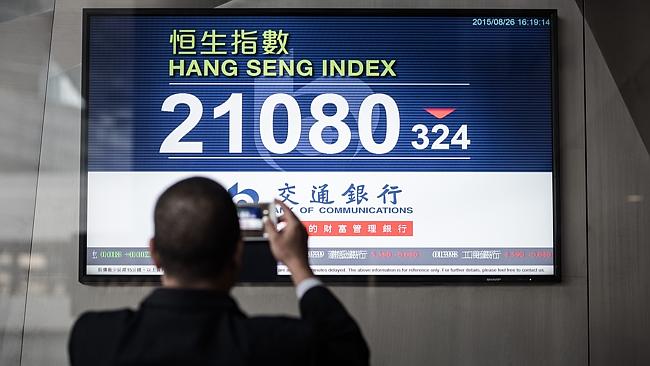Why China’s stock market crash is a good thing
THE slowdown in China is sending shudders through the world economy, but this analyst argues it will actually be good thing. Here’s why.

THE slowdown in China is sending shudders through the world economy, but this analyst argues it will actually be good for global growth.
Charles Dumas, an analyst with London’s Lombard Street Research, says China’s “grotesque economic distortions” have actually hurt the world economy.
In a research note, Mr Dumas argues China’s “excesses” over the past five years have been a major cause of weak recovery.
“Financial markets are right to be obsessed with China’s prospects. But they may be plain wrong to assume that the current Chinese slowdown is bad for global prospects,” he writes.
“On the contrary, China’s grotesque economic distortions have been major contributors to the sluggishness of world growth. Their correction should benefit most of us, not just China itself.”
China’s “excessive, wasteful” expenditure on real estate and construction has driven up the price of energy and raw materials, he explains, taking money away from global household incomes.
“China’s massive capex program has worsened the crowding out of consumers,” he writes.
“Its construction and real estate boom has inflated the cost of Chinese labour and added to the yuan’s overvaluation, the flip side of which is higher prices for consumers globally.”
Lack of consumer spending is the chief constraint on global growth. Mr Dumas describes the “widespread assumption” that reducing China’s wasteful spending will be bad for the world economy as a “mercantilist fallacy”.
China’s pullback should doubly boost consumers’ incomes through lower energy costs and cheaper Chinese goods, he argues.
“In America, gasoline powers people’s everyday lives and their Christmas presents are made in China. If both are now much cheaper, it may not mean that every day is going to be Christmas, but it is hard to see the mix as bad for the economy.”
It echoes earlier comments from Patrick Chovanec, managing director of Silvercrest Asset Management group, who has argued China’s rebalancing towards a global driver of consumer demand is long overdue.
But he pointed out yesterday Australia was uniquely exposed to the China slowdown.
“China’s slowdown in construction and investment hits Australia very hard because, unlike a lot of other countries, it really was able to ride China’s investment boom,” he told news.com.au
While it won’t be painless, long-term the shift will provide a boost to Australia’s export market, particularly if the free-trade deal goes ahead.
“China’s ability to consume — to provide end-user demand, not intermediate demand like the demand for iron ore — that’s what the world should care about, and that’s what the adjustment is about,” Mr Chovanec said.
Australian retail spending fell 0.1 per cent in July, official figures released on Thursday show, which was worse than economists’ expectations of a 0.4 per cent rise.
It followed yesterday’s worrying GDP figures, which painted a grim picture of falling national income and continued below-trend growth. GDP rose by just 0.2 per cent in the June quarter and 2 per cent for the financial year.
This morning, Finance Minister Mathias Cormann played down the weak GDP figures, blaming them on the largest fall in trade in 50 years.
“We are very optimistic about the outlook moving forward,” he told ABC radio, saying the government’s plan for stronger growth and jobs was on track.
— with AAP




